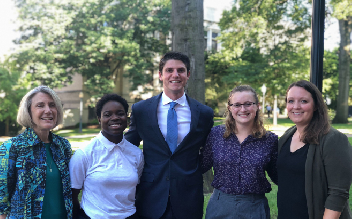
Sara Fikse
Contributing Writer
Last Saturday, Oct. 12, the Wooster/Orrville NAACP honored two 2018 and 2019 Applied Methods and Research Experience (AMRE) teams with the Community Enrichment Award for their outstanding work in the community. The ceremony took place at Kittredge Dining Hall as part of the NAACP’s annual Freedom Fund Dinner, which raises funds that go towards scholarships for Wayne County students of color who exhibit leadership in their community.
The two projects both centered on workforce re-entry in Wayne County through the implementation of inclusive hiring and supportive employment practices. Building on the research completed by the 2018 team of Emma Cotter ’20 and Halen Gifford ’21, the 2019 team consisting of Maggie Dougherty ’21, Noah Plotkin ’20 and Michelle Bryant ’22 developed a toolkit to aid businesses in the hiring process.
Dougherty emphasizes that the context and timing of the 2019 project was very important, explaining that “because unemployment in Wayne County was at an unprecedented low of 2.4 percent this summer, many employers were struggling so much to find employees that they just stopped looking.” In order to meet this employment demand, the team set out to identify underutilized populations within the workforce. They focused their attention on citizens with “alternative resumes,” or individuals with gaps in their resumes due to periods of incarceration, homelessness, struggles with addiction or other barriers to employment.
It was at this point that the team’s research of inclusive hiring and supportive employment methods led them to develop a toolkit of best practices. The team drew on the Supportive Employment models of other existing businesses, as well as interviews with local returning citizens conducted by the 2018 team in order to make sure that the toolkit best met the needs specific to Wayne County. The team emphasized the importance of considering the needs of both employers and returning citizens. “We knew that most businesses were not going to change their policies just because it was the “right” or charitable thing to do — we really had to find policies that would actually benefit the employers as well so that they would have an incentive to engage with this issue,” Dougherty explained.
The toolkit includes the teams’ key findings as well as recommendations for best practices when it comes to hiring and retaining employees. Two local companies are now in the process of implementing their model through pilot trials. The director of AMRE, professor of mathematics John Ramsay, comments on the importance of the projects for the community, saying, “These two particular projects will hopefully lead to the development of pathways and providing support for those coming out of the prison system or out of rehabilitation or recovery, to enter into the community as contributing citizens.”
Professor of economics Brooke Krause, an advisor to the 2019 AMRE team, also emphasized the unique nature of the College’s AMRE program, as it connects the College with local organizations, businesses, government and community leaders. These are the individuals and organizations dedicated to identifying and solving the issues faced by the shared community. The collaborative effort between the students and the community to create change was the driving force behind the project’s success. “It’s only when we use this type of multidimensional approach to identifying solutions that we can identify ways to create a more welcoming labor environment for all individuals, acknowledging challenges they face and the ways in which there are structural barriers to their employment, that we can actually make progress,” Krause shared.
The project opened up dialogue for an important conversation within the Wayne County community and their final presentation this summer brought together a diverse audience, including local administrators and legislators, community advocates, representatives of the local business community and concerned citizens. Dougherty credits this to the teams’ commitment to listening to both community advocates and local business leaders, explaining, “[the policies] really do benefit employers in a variety of ways, and I think we were successful in engaging the business community in this issue that is not often discussed in the business sphere.”
However, the team also stressed the need for the community to take responsibility for making sure that this work is carried on after the completion of AMRE. Plotkin urges members of the Wayne County community to “take this work and continue advocating for the implementation of inclusive hiring and supportive employment within local businesses.”
AMRE provides a challenge for students, allowing them to take on greater leadership roles and to engage actively with the community. Krause notes that the students are “the ones who have to drive the process and they have the respected leadership roles in these projects — from meeting with and communicating with the clients, to deciding the direction of their research and the recommendations.” The students bore a lot of responsibility but felt that the opportunity to do meaningful work made it worth the effort. Bryant commented, “My internship was an insightful experience. It provided me with the opportunity to learn about the community that I attend school in and also grow connections with the residents.”
